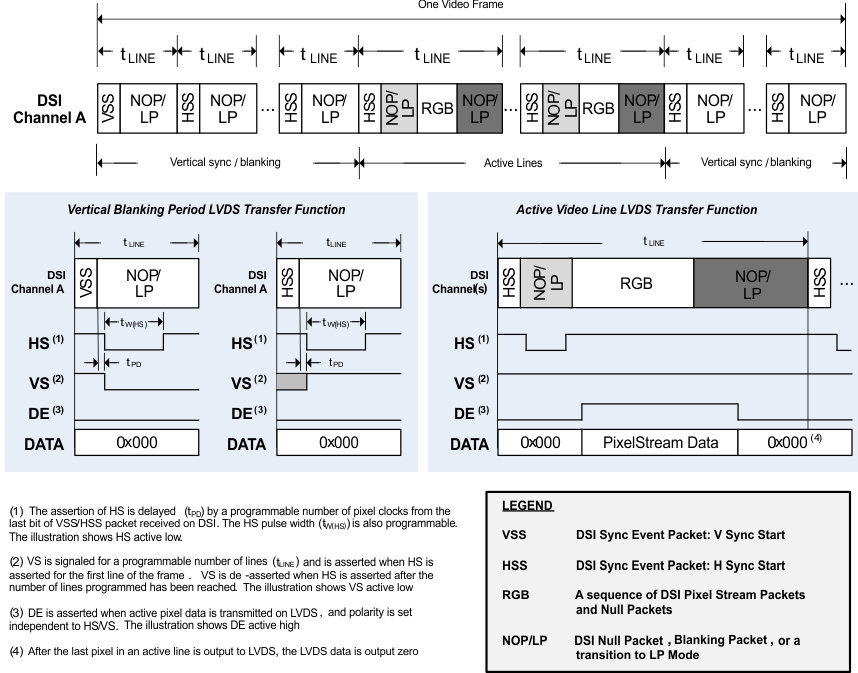SLLSEJ4B July 2016 – June 2018 SN65DSI85-Q1
PRODUCTION DATA.
- 1 Features
- 2 Applications
- 3 Description
- 4 Revision History
- 5 Pin Configuration and Functions
- 6 Specifications
- 7 Parameter Measurement Information
-
8 Detailed Description
- 8.1 Overview
- 8.2 Functional Block Diagram
- 8.3 Feature Description
- 8.4 Device Functional Modes
- 8.5 Programming
- 8.6
Register Maps
- 8.6.1 Local I2C Interface Overview
- 8.6.2 Control and Status Registers Overview
- 8.6.3
CSR Bit
- 8.6.3.1 ID Registers (address = 0x00 to 0x08)
- 8.6.3.2 Reset and Clock Registers
- 8.6.3.3 DSI Registers
- 8.6.3.4 LVDS Registers
- 8.6.3.5
Video Registers
- 8.6.3.5.1 Address 0x20
- 8.6.3.5.2 Address 0x21
- 8.6.3.5.3 Address 0x22
- 8.6.3.5.4 Address 0x23
- 8.6.3.5.5 Address 0x24
- 8.6.3.5.6 Address 0x25
- 8.6.3.5.7 Address 0x26
- 8.6.3.5.8 Address 0x27
- 8.6.3.5.9 Address 0x28
- 8.6.3.5.10 Address 0x29
- 8.6.3.5.11 Address 0x2A
- 8.6.3.5.12 Address 0x2B
- 8.6.3.5.13 Address 0x2C
- 8.6.3.5.14 Address 0x2D
- 8.6.3.5.15 Address 0x2E
- 8.6.3.5.16 Address 0x2F
- 8.6.3.5.17 Address 0x30
- 8.6.3.5.18 Address 0x31
- 8.6.3.5.19 Address 0x32
- 8.6.3.5.20 Address 0x33
- 8.6.3.5.21 Address 0x34
- 8.6.3.5.22 Address 0x35
- 8.6.3.5.23 Address 0x36
- 8.6.3.5.24 Address 0x37
- 8.6.3.5.25 Address 0x38
- 8.6.3.5.26 Address 0x39
- 8.6.3.5.27 Address 0x3A
- 8.6.3.5.28 Address 0x3B
- 8.6.3.5.29 Address 0x3C
- 8.6.3.5.30 Address 0x3D
- 8.6.3.5.31 Address 0x3E
- 8.6.3.6 IRQ Registers
- 9 Application and Implementation
- 10Power Supply Recommendations
- 11Layout
- 12Device and Documentation Support
- 13Mechanical, Packaging, and Orderable Information
8.3.6 DSI Video Transmission Specifications
The SN65DSI85-Q1 supports burst video mode and non-burst video mode with sync events or with sync pulses packet transmission as described in the DSI specification. The burst mode supports time-compressed pixel stream packets that leave added time per scan line for power savings LP mode. The SN65DSI85-Q1 requires a transition to LP mode once per frame to enable PHY synchronization with the DSI host processor; however, for a robust and low-power implementation, the transition to LP mode is recommended on every video line.
Figure 17 shows the DSI video transmission applied to SN65DSI85-Q1 applications. In all applications, the LVDS output rate must be less than or equal to the DSI input rate. The first line of a video frame shall start with a VSS packet, and all other lines start with VSE or HSS. The position of the synchronization packets in time is of utmost importance since this has a direct impact on the visual performance of the display panel; that is, these packets generate the HS and VS (horizontal and vertical sync) signals on the LVDS interface after the delay programmed into CHA_SYNC_DELAY_LOW/HIGH (CSR 0x28.7:0 and 0x29.3:0) and/or CHB_SYNC_DELAY_LOW/HIGH (CSR 0x2A.7:0 and 0x2B.3:0). When configured for dual DSI channels, the SN65DSI85-Q1 uses the VSS, VSE, and HSS packets from channel A to generate the HS and VS (horizontal and vertical sync) signals on the LVDS interface, and the VSS, VSE, and HSS packets from channel B are ignored.
As required in the DSI specification, the SN65DSI85-Q1 requires that pixel stream packets contain an integer number of pixels (i.e. end on a pixel boundary); it is recommended to transmit an entire scan line on one pixel stream packet. When a scan line is broken in to multiple packets, inter-packet latency shall be considered such that the video pipeline (ie. pixel queue or partial line buffer) does not run empty (i.e. under-run); during scan line processing, if the pixel queue runs empty, the SN65DSI85-Q1 transmits zero data (18’b0 or 24’b0) on the LVDS interface.
When configured for dual DSI channels, the SN65DSI85-Q1 supports ODD/EVEN configurations and LEFT/RIGHT configurations. In the ODD/EVEN configuration, the odd pixels for each scan line are received on channel A, and the even pixels are received on channel B. In LEFT/RIGHT mode, the LEFT portion of the line is received on channel A, and the right portion of the line is received on channel B. Neither the channel A LEFT portion input or the channel B RIGHT portion input per line shall exceed 1408 pixels, which is defined as ½ of the maximum line size (2560 pixels in WQXGA 2560x1600 mode) plus 10% headroom. The pixels received on channel B in LEFT/RIGHT mode are buffered during the LEFT side transmission to LVDS, and begin transmission to LVDS when the LEFT-side input buffer runs empty.
When configured for two single DSI channels, the SN65DSI85-Q1 requires that the LVDS output clocks for both video data streams be the same.
NOTE
When the HS clock is used as a source for the LVDS pixel clock, the LP mode transitions apply only to the data lanes, and the DSI clock lane remains in the HS mode during the entire video transmission.
The DSI85 does not support the DSI Virtual Channel capability or reverse direction (peripheral to processor) transmissions.
 Figure 17. DSI Channel Transmission and Transfer Function
Figure 17. DSI Channel Transmission and Transfer Function